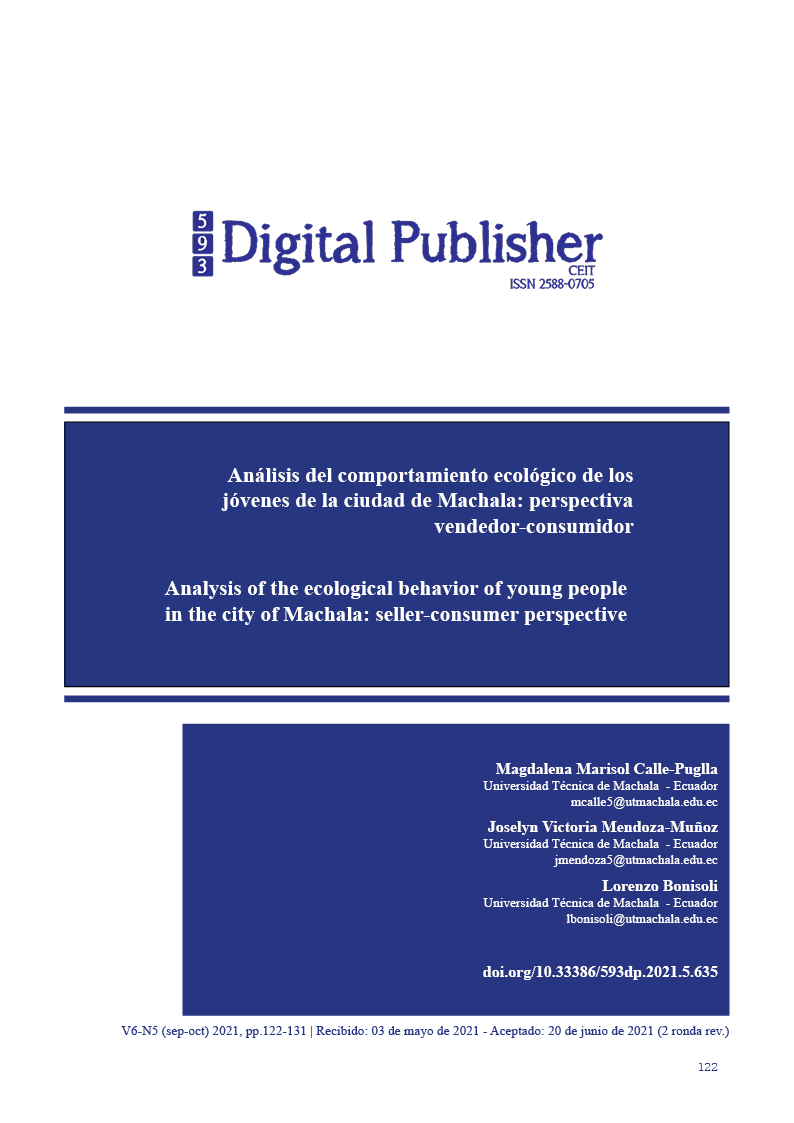Analysis of the ecological behavior of young people in the city of Machala: seller-consumer perspective
Main Article Content
Abstract
The objective of this research is to analyze the purchase behavior of responsible and ecological products of young people in the city of Machala, including the perspective of sellers, through a qualitative methodology. A wide bibliographic research of different authors about green marketing, ecological advertising and consumers was carried out. For the development of the research, a progressive interview was applied to consumers and sellers of ecological products in the city of Machala. The results obtained allowed us to identify six factors that guided the research, the majority of young people have a negative ecological behavior, their purchase or consumption is influenced by factors such as their economy, the culture that surrounds them, distrust in green advertising and lack of information provided on the packaging of the products.
Downloads
Article Details

This work is licensed under a Creative Commons Attribution-NonCommercial-ShareAlike 4.0 International License.
1. Derechos de autor
Las obras que se publican en 593 Digital Publisher CEIT están sujetas a los siguientes términos:
1.1. 593 Digital Publisher CEIT, conserva los derechos patrimoniales (copyright) de las obras publicadas, favorece y permite la reutilización de las mismas bajo la licencia Licencia Creative Commons 4.0 de Reconocimiento-NoComercial-CompartirIgual 4.0, por lo cual se pueden copiar, usar, difundir, transmitir y exponer públicamente, siempre que:
1.1.a. Se cite la autoría y fuente original de su publicación (revista, editorial, URL).
1.1.b. No se usen para fines comerciales u onerosos.
1.1.c. Se mencione la existencia y especificaciones de esta licencia de uso.
References
Álvarez, P., López, M., & González, E. (2015). El perfil del consumidor ecológico en España. Esic Market Economics and Business Journal, 46(2), 269-297. Obtenido de https://www.esic.edu/documentos/revistas/esicmk/151112_091147_E.pdf
Anchundia, M., Rosillo, N., & Marrero, Y. (2019). Revisión teórica de marketing verde y sus beneficios en la aplicación al sector turístico de Portoviejo. Revista Caribeña de Ciencias Sociales. Obtenido de https://www.eumed.net/rev/caribe/2019/02/sector-turistico-portoviejo.html
Bur, A. (2013). Marketing sustentable. Utilización del marketing sustentable en la industria textil y de la indumentaria. Cuadernos del Centro de Estudios en Diseño y Comunicación. , 45, 133-142. Obtenido de https://dialnet.unirioja.es/servlet/articulo?codigo=4200817
Cardona, J., Riaño, D., & Vaca, Y. (2017). Marketing y consumidor green. Aplicación de la Matriz Mic Mac para el análisis de tendencias. Revista Luciérnaga - Comunicación, 12-23. Obtenido de https://revistas.elpoli.edu.co/index.php/luc/article/view/1191/979
Chang, K.-C., Hsub, C.-L., Ya-Ti, H., & Chend, M.-C. (July de 2019). How green marketing, perceived motives and incentives influence behavioral intentions. Journal of Retailing and Consumer Services, 49, 336-345. doi:10.1016/j.jretconser.2019.04.012
Conte, M., & D´Elia, V. (2018). Desarrollo sostenible y conceptos “verdes”. Problemas del Desarrollo., 49(192), 61-84. Obtenido de https://www.redalyc.org/articulo.oa?id=11857345004
Dangelico, R., & Vocalelli, D. (1 de November de 2017). “Green Marketing”: An analysis of definitions, strategy steps, and tools through a systematic review of the literature. Cleaner Production, 165, 1263-1279. doi:10.1016/j.jclepro.2017.07.184
Davanzo, H. (2000). Estudio clínico inicial: (Primera entrevista). Revista chilena de neuro-psiquiatría, 38(1), 44-50. Obtenido de https://scielo.conicyt.cl/scielo.php?script=sci_arttext&pid=S0717-92272000000100007
Dias, R. (2008). Marketing ecológico y turismo. Estudios y Perspectivas en Turismo, 17(2), 140-155. Obtenido de https://www.redalyc.org/articulo.oa?id=180713896004
Díaz, V., & Calzadilla, A. (2016). Artículos científicos, tipos de investigación y productividad científica en las Ciencias de la salud. Revista Ciencias de la Salud, 14(1), 115-121. Obtenido de https://www.redalyc.org/pdf/562/56243931011.pdf
Dueñas Ocampo, S., Perdomo Ortiz, J., & Villa Castaño, L. E. (2014). El concepto de consumo socialmente responsable y su medición. Una revisión de la literatura. Estudios Gerenciales, 287-300. doi:10.1016/j.estger.2014.01.022
Duque, E. (2014). Geopolítica de los negocios y mercados verdes. Bogotá: ECOE Ediciones. Obtenido de https://www.ecoeediciones.com/wp-content/uploads/2015/04/Geopol%C3%ADtica-de-los-negocios-y-mercados.pdf
García, F. (2001). Empresa, medio ambiente y ecomárketing: una aproximación introductoria al estado de la cuestión. IUDE Documento de Trabajo. Serie Estudios, 2-20. Obtenido de https://www.researchgate.net/publication/28133815_Empresa_medio_ambiente_y_ecomarketing_una_aproximacion_introductoria_al_estado_de_la_cuestion
Hellín, P. (2007). Publicidad verde. La ecología y el respeto al medio ambiente como estrategias persuasivas en la publicidad turística. Cultura verde : ecología, cultura y comunicación, 209-228. Obtenido de https://dialnet.unirioja.es/servlet/articulo?codigo=3638012
Herrera, K., Acuña, M., Ramírez, M., & De la Hoz, M. (2016). Actitud y conducta pro-ecológica de jóvenes universitarios. Opción, 32(13), 456-477. Obtenido de https://www.redalyc.org/pdf/310/31048483023.pdf
Hwang, K., McDonald, S., & Oates, C. J. (03 de 2010). Sustainable consumption green consumer behavior when purchasing products. Sustainable Development(18), 20-31. doi:10.1002/sd.394
Isaza, J. (2016). Anuario de Investigación GIC. Revista Luciérnaga-Comunicación, 15, 1-94. doi:http://orcid.org/0000-0002-3243-4650
Jahnavi, N., Jogi, M., & Rinju, G. (10 de March de 2021). An empirical study on effective green marketing – Is ‘SHIFT Framework’ the golden (Green) key we are looking for? Science Direct, 44(7). doi:10.1016/j.matpr.2021.02.176
Jain, S., & Kaur, G. (2004). Green Marketing: An Attitudinal and Behavioural Analysis of Indian Consumers. Global Business Review, 5(2), 187-205. doi:10.1177/097215090400500203
Kumar, V., Dangi, H., & Vohra, A. (2014). Green Marketing: Development of Construct and Its Evolution. Asia-Pacific Journal of Management Research and Innovation, 10(2), 147-155. doi:https://doi.org/10.1177/2319510X14536220
Larson, R., & Farac, J. (2019). Profiling Green Consumers. Social Marketing Quarterly, 25(4), 275-290. doi:10.1177/1524500419882391
López M, M. J., Álvarez G, P., & González V, E. (30 de 12 de 2015). Conocimiento, valores e intenciones como determinantes del comportamiento ecológico. Revista Internacional De Sociología, 73(3). doi:10.3989/ris.2015.73.3.e018
Luyando, J., Alvarado, E., & Morales, D. (2017). Consumo con conciencia social y ecológica en nueve municipios del área metropolitana de Monterrey. Estudios Sociales, 27(50). Obtenido de https://www.redalyc.org/jatsRepo/417/41751187015/41751187015.pdf
Majerova, J. (2015). Analysis of Slovak Consumer’s Perception of the Green Marketing Activities. Economics and Finance, 26, 533-560. doi:10.1016/S2212-5671(15)00954-5
Moreira, J., & Barroso, L. (2020). Marketing verde – o perfil do consumidor verde. XXX Jornadas Portugués-Españolas de Gestión Científica: livro de resumos, 139. Obtenido de https://dialnet.unirioja.es/servlet/articulo?codigo=7405112
Moreno, M., & Tirado, I. (2019). Marketing ecológico como herramienta empresarial: Aplicación del marketing ecológico en productos de Lujo Gourmet. RA & DEM: Revista de Administración y Dirección de empresas, 3, 178-200. Obtenido de https://dialnet.unirioja.es/servlet/articulo?codigo=7203004
Novillo, L., Pérez, M., & Muñoz, J. (2018). Marketing verde, ¿tendencia o moda? Universidad y Sociedad | Revista Científica de la Universidad de Cienfuegos, 10(2), 100-105. Obtenido de http://scielo.sld.cu/pdf/rus/v10n2/2218-3620-rus-10-02-100.pdf
Pasquotto, T., Crespo, A., & Minciotti, S. (2017). What has been (short) written about greenwashing: A bibliometric research and a critical analysis of the articles found regarding this theme. RGSA – Revista de Gestão Social e Ambiental, 11(2), 54-72. doi:http://dx.doi.org/10.24857/rgsa.v11i2.1294
Průša, P., & Sadílek, T. (2019). Green Consumer Behavior: The Case of Czech Consumers of Generation Y. Social Marketing Quarterly, 25(4), 243-255. doi:10.1177/1524500419881783
Ruiz, A. (2018). El impacto del marketing ecológico en el comportamiento de compra del consumidor residente en Bogotá e estratos 3 y 4. (Tesis de Pregrado). Universidad Cooperativa de Colombia, Bogotá. Obtenido de https://repository.ucc.edu.co/bitstream/20.500.12494/11411/1/2018-impacto_marketing_ecologico.pdf
Salas, H. (2020). Publicidad ecológica: Direccionando el comportamiento del consumidor del siglo XXI. Fides et Ratio - Revista de Difusión cultural y científica de la Universidad La Salle en Bolivia, 19(19), 231-246. Obtenido de http://www.scielo.org.bo/scielo.php?script=sci_arttext&pid=S2071-081X2020000100011
Ubirajara, J., Reni Trento, L., Medeiros, G., Lopes de Sousa, A. B., Oly Ndubisi, N., Chiappetta Jabbour, C. J., . . . Zvirtes, L. (10 de 03 de 2021). Marketing verde en los supermercados: la Convencional y la digitalizado alternativas de comercialización para reducir los residuos. Science Direct, 296. doi:10.1016/j.jclepro.2021.126531




